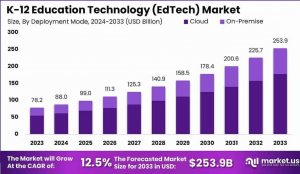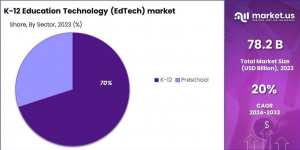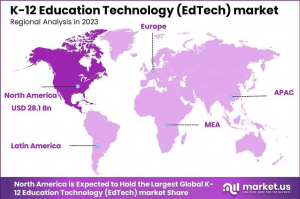K-12 Education Technology (EdTech) Market size is expected to be worth around USD 253.9 Billion By 2033, growing at a CAGR of 12.5% during the period to 2033.
In 2023, North America held a dominant market position in the K-12 Education Technology (EdTech) market, capturing more than a 36% share with revenues amounting to USD 28.1 billion.”
NEW YORK, NY, UNITED STATES, January 22, 2025 /EINPresswire.com/ -- The Global K-12 Education Technology (EdTech) Market size is expected to be worth around USD 253.9 Billion By 2033, from USD 78.2 Billion in 2023, growing at a CAGR of 12.5% during the forecast period from 2024 to 2033. Geographically, North America held a dominant market position in the K-12 Education Technology (EdTech) market in 2023, accounting for more than 36% of the market share, with revenues amounting to USD 28.1 billion.— Tajammul Pangarkar
The K-12 Education Technology (EdTech) Market is experiencing significant growth driven by the increasing adoption of digital learning tools, personalized education, and online learning platforms. The demand for interactive learning solutions is rising as schools embrace cloud-based tools, e-learning platforms, and virtual classrooms.
Artificial Intelligence (AI) transforms the market by enabling personalized learning experiences, automated administrative tasks, and advanced data analytics. The market also benefits from technological advancements in smart classrooms, AI-driven assessments, and learning management systems (LMS). These innovations meet the growing demand for engaging, scalable, and efficient educational solutions worldwide.
Key Statistics
According to market.us research analysis, the global EdTech market is projected to experience substantial growth in the coming years. It is estimated to reach approximately USD 549.6 billion by 2033, reflecting a significant increase from its value of USD 146.0 billion in 2023. This translates to a robust compound annual growth rate (CAGR) of 14.2% from 2024 to 2033.
The Global Generative AI in EdTech market is also expected to witness remarkable expansion, reaching USD 8,324 million by 2033, up from USD 268 million in 2023. This marks a substantial CAGR of 41% during the forecast period from 2024 to 2033.
Additionally, the Global AI in EdTech market is set for significant growth, with an estimated size of USD 92.09 billion by 2033, compared to USD 3.65 billion in 2023, showing a notable CAGR of 38.1% from 2024 to 2033.
The EdTech and Smart Classroom market is projected to reach approximately USD 498.5 billion by 2032, growing steadily at a CAGR of 15% from 2023 to 2032. Its valuation in 2023 is USD 146.8 billion.
A survey by EdWeek revealed that 87% of K-12 educators reported an improvement in their tech skills during the pandemic. Moreover, students using devices for more than 60 minutes per week consistently achieved better academic results, though this metric varies across countries.
The corporate education technology sector is valued at USD 27.5 billion, and over 70% of schools and universities are preparing to introduce online undergraduate programs within the next three years.
Request Sample Here @ https://market.us/report/primary-edtech-market/request-sample/
Key takeaways
- The K-12 Education Technology (EdTech) Market is projected to reach approximately USD 253.9 billion by 2033, up from USD 78.2 billion in 2023, reflecting a compound annual growth rate (CAGR) of 12.5% during the forecast period from 2024 to 2033.
- In 2023, the Cloud segment demonstrated a dominant presence in the K-12 Education Technology (EdTech) market, securing over a 70% market share.
- The Software segment also maintained a strong position within the K-12 Education Technology (EdTech) market in 2023, capturing over 41% of the market share.
- The K-12 segment was a leading force in the K-12 Education Technology (EdTech) market in 2023, holding more than a 70% share.
- The Consumer segment dominated the K-12 Education Technology (EdTech) market in 2023, with a substantial market share exceeding 80%.
- Geographically, North America held a dominant market position in the K-12 Education Technology (EdTech) market in 2023, accounting for more than 36% of the market share, with revenues amounting to USD 28.1 billion.
Analysts Viewpoint
The K-12 Education Technology (EdTech) Market is set to experience robust growth, driven by government incentives and increasing investments in digital learning solutions. Governments worldwide are recognizing the potential of EdTech in enhancing education and are therefore increasing funding for digital infrastructure, especially in developing regions. Programs promoting digital literacy and online learning platforms are accelerating the adoption of technology in schools.
Technological innovations such as AI-driven personalized learning, cloud-based platforms, and smart classrooms are reshaping the educational landscape, providing opportunities for advanced learning tools and automated administrative processes. These innovations improve student engagement, streamline teacher workflows, and enhance learning outcomes.
Investment opportunities are abundant, especially for companies developing scalable solutions that address accessibility, engagement, and performance tracking in K-12 education. However, potential risks include data privacy concerns, cybersecurity threats, and the digital divide in less-developed regions.
Consumer awareness is rising, with parents and students increasingly seeking interactive and personalized learning experiences. As this awareness grows, there will be more demand for high-quality EdTech products.
The regulatory environment is also evolving, with governments introducing new policies around data protection, online safety, and curriculum standards to ensure the safe and effective use of educational technologies. These factors collectively influence the market's growth trajectory, making it an exciting but complex space for investment.
Get the Detailed Report at Exclusive Discount https://market.us/purchase-report/?report_id=123208
Report Segmentation
The Segmentation includes by deployment mode (cloud and on-premise), by type (hardware, software, and content), by sector (preschool and k-12), and by end-user (business and consumer). The K-12 Education Technology (EdTech) Market report is segmented into various key sections to provide a comprehensive analysis. The report begins with an overview, outlining the market definition, scope, and dynamics, including drivers, challenges, and growth opportunities. It delves into technology trends, highlighting the impact of AI and machine learning in education, as well as the adoption of cloud solutions and the integration of smart classrooms.
The market is further divided by product type, which includes software, hardware, and cloud-based platforms, each playing a pivotal role in the growth of EdTech. Application-wise segmentation focuses on K-12 schools and the rise of online learning platforms.
Geographically, the report covers major regions such as North America, Europe, and Asia-Pacific, providing insights into regional growth patterns. The competitive landscape discusses key market players, their strategies, and recent developments. Lastly, the report highlights investment opportunities, along with the risks and challenges associated with the market's expansion.
Key Market Segments
- By Deployment Mode
-- Cloud
-- On-Premise
- By Type
-- Hardware
-- Software
-- Content
- By Sector
- Preschool
-- K-12
- By End-User
-- Business
-- Consumer
Drivers
The K-12 Education Technology (EdTech) Market is primarily driven by the growing demand for personalized learning and digital transformation in education. The adoption of cloud-based platforms and AI-driven solutions has revolutionized how education is delivered, making it more interactive, accessible, and tailored to individual learning styles. Government support and funding for digital learning initiatives in schools are also crucial factors propelling market growth. As remote and hybrid learning models become increasingly popular, especially post-pandemic, the need for effective online learning tools and digital classrooms is expanding. Additionally, the rapid adoption of smart classrooms, interactive learning devices, and virtual labs further boosts the demand for EdTech solutions, fostering long-term growth in the sector.
Restraints
One of the key restraints for the EdTech market is the digital divide, which creates inequality in access to technology across regions, especially in developing countries. Despite the growth of digital learning solutions, many students in rural or underserved areas lack access to reliable internet or adequate devices, hindering the widespread adoption of EdTech tools. Furthermore, high implementation costs and the need for teacher training can also deter schools from investing in advanced technological solutions. There are also concerns around data privacy and cybersecurity, as the increase in digital learning platforms exposes sensitive student data to potential risks.
Challenges
A major challenge in the EdTech market is keeping up with rapid technological advancements while ensuring that the tools remain effective and accessible. Constant innovations in AI, machine learning, and IoT demand continuous updates to software and infrastructure, which can be resource-intensive for educational institutions. Additionally, the resistance to change from traditional teaching methods and the need for adequate teacher training to maximize the use of EdTech tools remain significant barriers to adoption.
Opportunities
The growing demand for personalized learning presents a significant opportunity for the EdTech market. AI-powered platforms that cater to individualized learning paths, real-time performance tracking, and adaptive content delivery can enhance student engagement and performance. Furthermore, the shift towards online certifications and professional development programs offers new revenue streams for EdTech companies. The rise of gamification in learning and immersive experiences using VR/AR also offers exciting growth avenues for educational technology providers.
Key Player Analysis
The K-12 Education Technology (EdTech) Market features prominent players such as Google for Education, Microsoft Corporation, and Pearson PLC. These companies lead by offering innovative solutions, such as cloud-based learning platforms, AI-powered educational tools, and interactive digital classrooms. Google for Education focuses on providing scalable, cloud-based tools like Google Classroom.
Microsoft is known for its Azure-based education solutions and collaboration tools such as Teams for Education. Pearson offers a wide range of learning resources and digital content. These companies are continuously evolving their offerings to meet the increasing demand for personalized, flexible, and interactive learning experiences.
Top Key Players
- Duolingo
- Mcgraw-hill Education
- ABCmouse
- IXL Learning
- Seesaw
- DreamBox Learning
- Epic!
- Blockly
- Byju’s
- Panorama Education
- Outschool
- Other Key Players
Recent Developments
In 2024, Google for Education expanded its reach by launching new AI-driven tools to enhance personalized learning experiences, focusing on increasing engagement through smarter content delivery. Similarly, Microsoft introduced enhanced AI features within Teams for Education, improving collaboration and communication for students and teachers.
Pearson also made strides by unveiling new digital textbooks and adaptive learning platforms, utilizing machine learning to offer customized content. These innovations reflect the growing trend of leveraging AI and cloud-based platforms to create more interactive, scalable, and accessible learning solutions across K-12 education systems globally.
Conclusion
In conclusion, the K-12 Education Technology (EdTech) Market is experiencing rapid growth driven by technological advancements, increasing demand for personalized learning, and widespread adoption of cloud-based platforms. Key players like Google for Education, Microsoft, and Pearson are at the forefront of this transformation, continuously innovating with AI-driven solutions, smart classrooms, and digital content to enhance the learning experience. As the market continues to expand, the integration of advanced technologies such as AI, machine learning, and cloud solutions will play a critical role in shaping the future of education, offering vast opportunities for growth and development in the global education sector.
Lawrence John
Prudour
+91 9130855334
email us here
Visit us on social media:
Facebook
LinkedIn
Legal Disclaimer:
EIN Presswire provides this news content "as is" without warranty of any kind. We do not accept any responsibility or liability for the accuracy, content, images, videos, licenses, completeness, legality, or reliability of the information contained in this article. If you have any complaints or copyright issues related to this article, kindly contact the author above.




